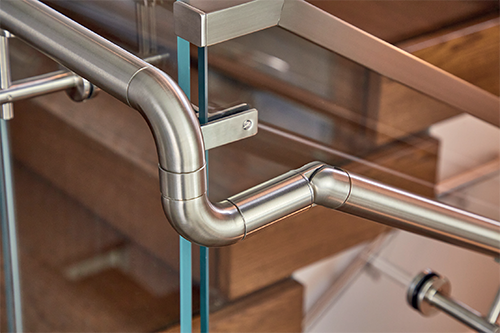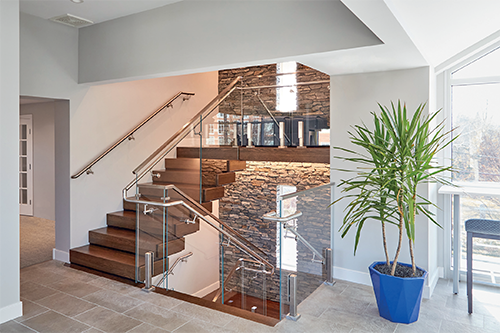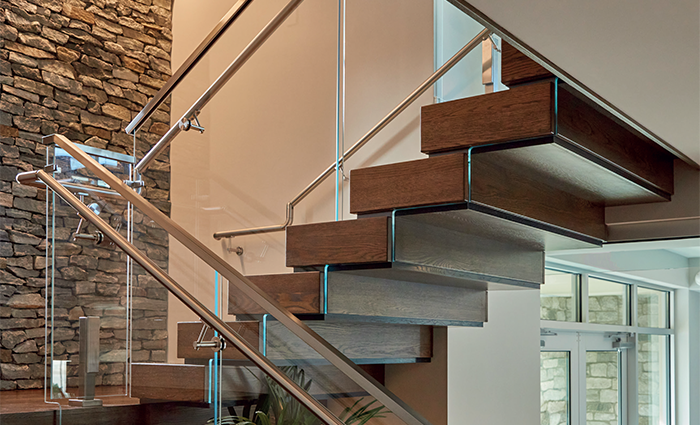By putting people first and ideas second, everything else falls perfectly into place for Viewrail
Twenty years ago, Len Morris, Chief Executive Officer, founded Viewrail in the basement of his home. From these incredibly humble beginnings, the company today is the leading national provider of modern stairs and railing. Based in Indiana, its multi-facility campus sprawls across the Midwest and offers proudly American-made goods. All of its raw materials are domestically sourced and locally produced, and its 400,000 square feet of manufacturing space boasts the most advanced equipment available.
Len made the decision to change the company’s direction eight years ago, by focusing on its own product line and ideas. The market had been calling out for a systemized approach to modern stairs and railing, one that could rapidly model designs with the implementation of 3D modeling software, and allow for the use of a range of materials from steel, aluminum, wood and glass to porcelain. Today, this encompasses the company’s mainstay output, but as Len states, there’s something deeper that is responsible for Viewrail’s vision and subsequent monumental success.
Built on values
“Besides being the best fighter pilot who ever lived, John Boyd was a great thinker – one whose vision has hugely influenced the ethos behind Viewrail,” Len opens. “He believed that people came first, followed by ideas and then things. Our emulation of this is to primarily focus on our people, with ideas, coming up sharply in second – with these two factors set in place, they can be applied to the things, which in our case includes the hardware, machinery and manufacturing equipment. ‘Things’ are only there to support people and their ideas.”
Despite the swathes of uncertainty in which industry is currently operating earlier this year, Viewrail implemented an inflation protection plan for its employees to help them cope with the cost-of-living crisis. The company is reviewing staff members’ wages against inflation at the end of every quarter, a policy that has come less than a year since it decided to make its minimum hourly wage $25 and salaried income $55,000. A spokesperson stated that it’s simply another way in which Viewrail can apply its ethical and individualistic approach to each employee and their family members.
This idea is fundamental to Viewrail’s working culture, as Len details further: “We have three values: eternal, responsive and flourishing. We treat each and every individual as an eternal being, knowing that their value is held in far more than just their work. We are an incredibly responsive company; running through development cycles in correlation with market trends, to be sure that we are giving our customers and vendors what they need to be prosperous. In everything we do, we always bring our focus back to each team member as an individual. We’re always striving to figure out how we can pay that person a little bit more by creating the correct situation in which they can deliver more value to the customer.”
The ‘people first’ mentality weaves through Viewrail’s approach to manufacturing and product development, with its strong commitment to giving customers what they want. The typical process starts by identifying market needs, above plant capabilities, then building the required methods and equipment to carry out the necessary processes. Its arsenal of equipment includes 15 robotic arms, a highly developed pick-to-light inventory system (for the management of hardware, given 50,000 pieces on average are shipped out per day) and 2000 axes under CNC control.
Seamless operation
As Len explains: “We run through the development cycle at twice the rate at which the market is going to make sure we’re always a full cycle ahead. We have devoted 20,000 square feet of our manufacturing space to research and development, and every two months, we host a new product showcase – the last of which featured 43 new items. In terms of customer sales, once we have the project signed off and the deposit has been made, we have a ten-business-day manufacturing timeframe on anything the customer wants. This is then shipped out via one of our five distribution centers across the US. We can fully control the design as we have ownership of our supply lines – with investments into lumber, all the way back to the log, and in aluminum, all the way back to the extrusion process. These ownerships have really helped us to weather a lot of storms and challenges.”
Furthermore, Viewrail impresses a great deal of importance on its green strategies; it has moved its plastic-free deadline up to next year and is currently on target to generate 75 percent of its own renewable energy too. The company has fitted all of its manufacturing facilities with solar panels and employed algorithms to assist in managing its lumber utilization, to the point where it’s operating on a closed loop with regards to wood waste. Besides its glass recycling program, the transportation division has been greatly restricted – meaning that the supply-chain-owned material plants are located within ten miles of the manufacturing facilities to reduce unnecessary travel. Len takes great pride in Viewrail’s domestically produced materials: “We have to become less reliant on imported products. In the US, we need to get better at utilizing resources on our home turf. The foolishness of harvesting trees, sending them to Asia for minor work and then shipping them back has to stop.”
For the future, Viewrail is looking to expand its distribution network by a further seven centers and to continue honing its current practices. As Len concludes: “We will strive further to innovate products that are installation friendly and that consume less energy and raw materials during the production process. Ultimately, we want to provide our customers with as much value as possible.”
www.viewrail.com
